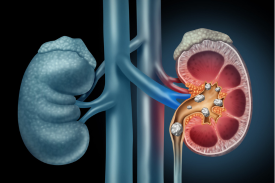Dietary Guidelines to Ward Off Urinary/Kidney Stones: A Comprehensive Approach
Urinary or kidney stones can be excruciatingly painful and disrupt daily life. Fortunately, many cases can be prevented or managed through dietary modifications. In this article, we’ll delve into dietary recommendations aimed at preventing the formation of urinary/kidney stones, offering valuable insights for individuals seeking to maintain optimal urinary tract health.
- Stay Hydrated: Adequate hydration is crucial for preventing urinary stone formation. Aim to drink plenty of water throughout the day, aiming for at least 8-10 glasses (about 2-2.5 liters) daily. Increased fluid intake helps dilute urine, making it less concentrated and reducing the risk of stone formation. Water is the best choice, but herbal teas and diluted fruit juices can also contribute to overall hydration.
- Limit Sodium Intake: High sodium intake can increase urinary calcium excretion, contributing to the formation of calcium-based stones. To reduce sodium intake, minimize the consumption of processed and packaged foods, which are often high in salt. Instead, opt for fresh, whole foods and use herbs, spices, and lemon juice to flavor dishes.
- Moderate Animal Protein Consumption: Diets high in animal proteins, such as meat, poultry, and fish, can increase the risk of uric acid and calcium oxalate stone formation. While protein is an essential part of a balanced diet, it’s advisable to consume it in moderation. Consider incorporating plant-based protein sources like beans, lentils, tofu, and nuts into your meals.
- Increase Dietary Calcium: Contrary to popular belief, adequate dietary calcium intake may actually help prevent kidney stone formation. Calcium binds with oxalate in the intestines, reducing its absorption and subsequent excretion in the urine. Opt for calcium-rich foods such as dairy products (low-fat or non-fat options are preferable), leafy greens, and fortified plant-based milks.
- Limit Oxalate-Rich Foods: Oxalates are compounds found in certain foods that can contribute to the formation of calcium oxalate stones. Limiting intake of high-oxalate foods may help prevent stone formation in susceptible individuals. Foods such as spinach, rhubarb, beets, nuts, chocolate, and tea are known to be high in oxalates. Nonetheless, it’s crucial to recognize that cooking these foods can help decrease their oxalate levels.
- Maintain a Healthy Weight: Obesity and excess body weight are associated with an increased risk of urinary stone formation. Strive to attain and sustain a healthy weight by following a well-rounded diet and engaging in consistent physical activity. Losing excess weight can help reduce urinary excretion of calcium and oxalate, lowering the risk of stone formation.
- Monitor Caffeine and Alcohol Intake: Caffeine and alcohol can have diuretic effects, increasing urine production and potentially leading to dehydration if consumed excessively. While moderate consumption is generally acceptable, excessive intake of caffeinated and alcoholic beverages should be avoided, especially in individuals prone to urinary stone formation.
- Consider Citrus Fruits: Citrus fruits like lemons, limes, and oranges contain citrate, a compound that can help prevent stone formation by inhibiting the growth of crystals in the urine. Incorporating citrus fruits into your diet or drinking diluted citrus juices may help increase urinary citrate levels and reduce the risk of stone formation.
Summary:
In Pune individuals seeking expert guidance on preventing urinary/kidney stones can consult with Dr. Sunil Mhaske, a distinguished Consultant Urologist at the Institute Of Nephro Urology (PINU) in Pimple Saudagar, recognized as one of the best urology hospitals in Pune. With his expertise and experience, Dr. Mhaske provides personalized care and comprehensive treatment strategies to patients, helping them maintain optimal urinary tract health and prevent the recurrence of urinary/kidney stones.
Incorporating these dietary recommendations into your daily routine can significantly reduce the risk of urinary/kidney stone formation and promote overall urinary tract health. However, it’s essential to consult with a healthcare professional or registered dietitian before making significant dietary changes, especially if you have a history of urinary stones or underlying health conditions. By taking proactive steps to maintain a balanced diet and stay hydrated, you can support your urinary tract health and reduce the likelihood of experiencing the discomfort associated with urinary/kidney stones.

